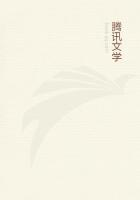Gifted as he was, learned in many directions, an enthusiastic mathematician, master of several languages, occasionally full of wit and humour, and even good sense, yet he gave his books the strangest titles, and his ideas were no less whimsical. His style is mystic, fastidious, and too often of a wearisome length and obscurity; his verses rhyme anyhow, or not at all; but vivacity, force and heat are never lacking, and the Maitland Club did well in reprinting, in 1834, his various works, which are very rare. Yet, in spite of their curious interest, he owes his real distinction and the survival of his name to his translation of Rabelais.
The first two books appeared in 1653. The original edition, exceedingly scarce, was carefully reprinted in 1838, only a hundred copies being issued, by an English bibliophile T(heodore) M(artin), whose interesting preface I regret to sum up so cursorily. At the end of the seventeenth century, in 1693, a French refugee, Peter Antony Motteux, whose English verses and whose plays are not without value, published in a little octavo volume a reprint, very incorrect as to the text, of the first two books, to which he added the third, from the manuscript found amongst Urquhart's papers. The success which attended this venture suggested to Motteux the idea of completing the work, and a second edition, in two volumes, appeared in 1708, with the translation of the fourth and fifth books, and notes.
Nineteen years after his death, John Ozell, translator on a large scale of French, Italian, and Spanish authors, revised Motteux's edition, which he published in five volumes in 1737, adding Le Duchat's notes; and this version has often been reprinted since.
The continuation by Motteux, who was also the translator of Don Quixote, has merits of its own. It is precise, elegant, and very faithful.
Urquhart's, without taking liberties with Rabelais like Fischart, is not always so closely literal and exact. Nevertheless, it is much superior to Motteux's. If Urquhart does not constantly adhere to the form of the expression, if he makes a few slight additions, not only has he an understanding of the original, but he feels it, and renders the sense with a force and a vivacity full of warmth and brilliancy. His own learning made the comprehension of the work easy to him, and his anglicization of words fabricated by Rabelais is particularly successful. The necessity of keeping to his text prevented his indulgence in the convolutions and divagations dictated by his exuberant fancy when writing on his own account. His style, always full of life and vigour, is here balanced, lucid, and picturesque. Never elsewhere did he write so well. And thus the translation reproduces the very accent of the original, besides possessing a very remarkable character of its own. Such a literary tone and such literary qualities are rarely found in a translation. Urquhart's, very useful for the interpretation of obscure passages, may, and indeed should be read as a whole, both for Rabelais and for its own merits.
Holland, too, possesses a translation of Rabelais. They knew French in that country in the seventeenth century better than they do to-day, and there Rabelais' works were reprinted when no editions were appearing in France. This Dutch translation was published at Amsterdam in 1682, by J.
Tenhoorn. The name attached to it, Claudio Gallitalo (Claudius French-Italian) must certainly be a pseudonym. Only a Dutch scholar could identify the translator, and state the value to be assigned to his work.
Rabelais' style has many different sources. Besides its force and brilliancy, its gaiety, wit, and dignity, its abundant richness is no less remarkable. It would be impossible and useless to compile a glossary of Voltaire's words. No French writer has used so few, and all of them are of the ******st. There is not one of them that is not part of the common speech, or which demands a note or an explanation. Rabelais' vocabulary, on the other hand, is of an astonishing variety. Where does it all come from? As a fact, he had at his command something like three languages, which he used in turn, or which he mixed according to the effect he wished to produce.
First of all, of course, he had ready to his hand the whole speech of his time, which had no secrets for him. Provincials have been too eager to appropriate him, to make of him a local author, the pride of some village, in order that their district might have the merit of being one of the causes, one of the factors of his genius. Every neighbourhood where he ever lived has declared that his distinction was due to his knowledge of its popular speech. But these dialect-patriots have fallen out among themselves. To which dialect was he indebted? Was it that of Touraine, or Berri, or Poitou, or Paris? It is too often forgotten, in regard to French patois--leaving out of count the languages of the South--that the words or expressions that are no longer in use to-day are but a survival, a still living trace of the tongue and the pronunciation of other days. Rabelais, more than any other writer, took advantage of the happy chances and the richness of the popular speech, but he wrote in French, and nothing but French. That is why he remains so forcible, so lucid, and so living, more living even--speaking only of his style out of charity to the others--than any of his contemporaries.
It has been said that great French prose is solely the work of the seventeenth century. There were nevertheless, before that, two men, certainly very different and even hostile, who were its initiators and its masters, Calvin on the one hand, on the other Rabelais.












